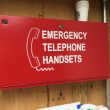Homage to the truly unsung
I drove to Toronto last weekend for the World Baseball Classic, a roundtrip of about a thousand miles. It was during the long, dreary sojourn through western Ontario that I got the idea for this column.
I’ve always liked car trips, as they afford an opportunity to see the continent in a way that can’t be replicated at 30,000 feet. On this trip, I saw the biggest radio towers I’ve ever seen. There was a time in my life, before I got involved in this publication, when I would have scarcely noticed a communications tower. I would have noticed these — that’s how big they were.
I started to think about the people who have to climb those monsters to install and repair equipment. And that got me thinking about a response I recently received from a reader.
I had written a story for our web site on the need to motivate 911 communications center dispatchers and call-takers. (An expanded article on this topic appears in the March print edition.) In this story, I quoted a 911 communications center manager who called dispatchers and call-takers “unsung heroes.”
In response, the reader suggested that the people who install the communications systems that public-safety professionals rely upon are the truly unsung heroes. Engineers whose intelligence dwarfs that of the common man determine the type of system that needs to be installed based on myriad geographical/topographical factors and how such systems should be deployed to maximize their effectiveness. Field technicians often work in harsh conditions and in rugged environments. Many of them also put their lives at risk, just like the first responders they serve, by climbing high into the sky to deploy and maintain these vital systems.
But how often does the public think of that? Not often, I fear. Indeed, I believe it would be safe to say that most of the general population isn’t even aware that these people exist. I would bet that the only time first responders think about radio engineers and technicians is when something goes wrong. That’s only human nature.
Nevertheless, this is ironic, because the ability of police, fire and emergency medical professionals to serve and protect can depend on how well their communications systems and equipment work. When they don’t work well, lives often are lost — sometimes their own.
So, to those who ensure that these crucial communications systems perform at a high level, I offer a long overdue and a well-deserved word of thanks. And if you’re attending IWCE in Las Vegas next week, stop by our booth (1433). We’d love to meet you and hear your stories.
Related Stories
What do you think? Tell us in the comment box below.

















